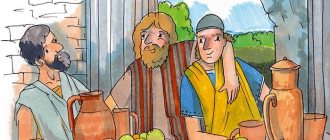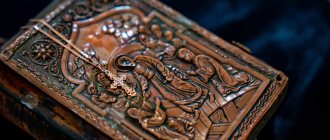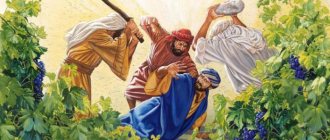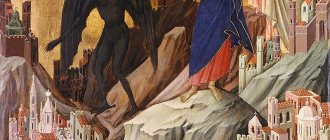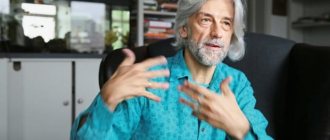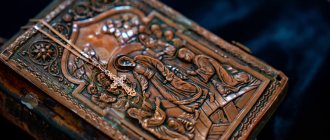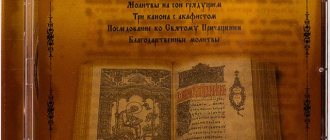Interpretation of the Gospel for every day of the year. Week of the Prodigal Son
Luke, 79 readings, 15, 11-32
The Lord spoke the following parable: a certain man had two sons; and the youngest of them said to his father: Father! give me the next part of the estate. And the father divided the estate for them. After a few days, the youngest son, having collected everything, went to a far side and there squandered his property, living dissolutely. When he had lived through everything, a great famine arose in that country, and he began to be in need; and he went and accosted one of the inhabitants of that country, and he sent him to his fields to graze pigs; and he was glad to fill his belly with the horns that the pigs ate, but no one gave it to him. When he came to his senses, he said, “How many of my father’s hired servants have an abundance of bread, but I am dying of hunger; I will get up and go to my father and say to him: Father! I have sinned against heaven and before you and am no longer worthy to be called your son; accept me as one of your hired servants. He got up and went to his father. And while he was still far away, his father saw him and had compassion; and, running, fell on his neck and kissed him. The son said to him: Father! I have sinned against heaven and before you and am no longer worthy to be called your son. And the father said to his servants: Bring the best robe and dress him, and put a ring on his hand and sandals on his feet; and bring the fatted calf, and kill it; Let's eat and have fun! For this son of mine was dead and is alive again, he was lost and is found. And they started having fun. His eldest son was in the field; and returning, when he approached the house, he heard singing and rejoicing; and calling one of the servants, he asked: what is this? He said to him, “Your brother has come, and your father has killed the fatted calf, because he received him healthy.” He became angry and did not want to enter. His father came out and called him. But he said in response to his father: Behold, I have served you for so many years and have never violated your orders, but you never gave me even a kid so that I could have fun with my friends; and when this son of yours, who had wasted his wealth with harlots, came, you killed the fatted calf for him. He said to him: My son! You are always with me, and all that is mine is yours, and it was necessary to rejoice and be glad that this brother of yours was dead and came to life, was lost and was found.
The parable of the prodigal son is about sin and repentance. This is a story about the relationship of humanity to God, the people to the King, about how our children are now leaving us, and about how one is connected to the other. The lost son is first and foremost the youngest son. He demands from his father: “Father, give me part of your estate, what is due to me by right.” This is the beginning of all the troubles.
When people look at God's gifts as something that God has to give them, it turns out to be madness even from a practical earthly point of view. Give me now what is due to me, and I do not need all my rights to the estate in the so-called future, I renounce them. The greatest madness of a sinful person is to be immediately content with a part, abandoning the whole. This desire now to get into your hands no matter how much, as long as, so to speak, in cash, that is, to receive all the benefits here in this life. People look only at what is visible, looking for immediate success and immediate pleasure. And they care little about the life of the next century.
Why did this young man so want to have his share completely at his disposal? His father's guardianship was painful to him, and he desired freedom - that which is falsely called by its name. Look at the madness of most of today's young people. They were well able to explain through all existing means of influence that they will never become masters of their destiny until they break all God’s bonds and instead tie themselves hand and foot with the bonds of their own lusts. This is the essence of man's apostasy from God. People do not want to be bound by Divine commandments. They want to be like gods themselves, knowing good and evil. And as a result, they find themselves knowing no evil or good, except what they like.
The images of the Heavenly Father, the earthly fatherland and the native father are revealed in the parable one through the other. And sometimes they seem to merge. This young man wants to get away from his father's gaze. He doesn't trust his father's management, he wants to have his own share because he thinks his father will limit his spending, and he doesn't like that. He is proud of himself and has a high opinion of his abilities. He thinks that if he takes his part of the estate, he will manage it better than his father and will prove himself to be a brighter personality. Time and again the word of God tells us that pride, more than any other sin, destroys a person, especially in youth.
We see how kind and meek a father is to his son. He divided his estate. But, apparently, the eldest son wanted his father to leave his part in his power. And we see what he got for it. “Everything that’s mine is yours,” he hears from his father. The youngest son received from his father as much as he wanted. So he could see, at least over time, his father's kindness. Through this he will be able to understand his own folly, and that he has not been such a wise steward of his affairs.
How did he dispose of everything when he received his share? He was not slow in spending it. And after a short time he turned into a beggar. It seems that his whole intention was to waste everything as quickly as possible. And for this, having collected everything, he went to a distant country.
We can see that the life of the prodigal son in this removal to a foreign country is a description of the spiritual state in which fallen man, who had fallen away from God, found himself. This is, first of all, a state of separation from God, distance from him. That is why on the Sunday of the Prodigal Son at Matins the sorrowful song “On the Rivers of Babylon” is heard for the first time.
This young man left his father’s house, and sin is always apostasy from God. The misfortune of sinners lies in the fact that they have moved away from God, and are increasingly moving away from Him. The world is a “country far away” in which people live. But the extent of removal may vary. We went as far from our home as we could. What is hell, after all, if not the ultimate distance from God? And this hell can begin here on earth. What are unimaginable misfortunes and troubles on our earth if not distance from God? How did we come to this country, which was once called Holy Russia?
The parable shows us that the spiritual state of fallen man is a complete waste of life. He squandered his wealth by living dissolutely, with harlots, and in a short time he spent it all. So we squandered all our wealth. Oh, if only it were earthly! Those who voluntarily commit sin squander their father's gifts. They waste their mind and all the strength of their soul. They not only bury their talents, but shamelessly sell them. The gifts of God, which they should have used to serve God and people, are used to serve vicious desires. The human soul becomes a hostage to the world, the flesh and the devil, squanders its wealth and lives dissolutely.
Further, the parable shows the spiritual state of a person living in sin as a state of bitter need. When he had lived through everything, a great famine arose in that country, and he began to be in need. A riotous, wasteful life soon brings a person to a beggar's purse. Especially when bad times come, as retribution for poor management of the goods received.
Man refuses God's mercy, preferring the cruelty of the devil to Him. For the sake of the sweetness of a sinful life, the riches of the transitory world, he committed this renunciation of God's gifts, and now he is perishing from their lack.
He who has withdrawn from God lacks what is most necessary for his soul. He has neither food nor clothing. If only for the outer man! He has no hope that he will be given consolation after a painful death. The spiritual state of a person reaping the fruits of his sin is a country where a great famine has occurred. Suffering and despair are aggravated by the knowledge that he himself, overcoming all obstacles, struggled to achieve this.
Sin begins with exaltation and pride, however, the spiritual state of the sinner inevitably reveals itself as a low, slave state. When the young man's riotous joy brought him to poverty, need forced him to go into slavery. He went and hired himself to one of the inhabitants of that country. The wickedness which was previously manifested in debauchery is now revealed in the life of slavery. How could this proud, independent young man so humiliate himself, dishonor himself, in order to go into such service for such an evil master?
Famine and Gulags, but they said: “We are ours, we will build a new world,” “we have no barriers either at sea or on land,” and today there are certainly no barriers. The evil master sent him to his fields, it is said in the Gospel, not to herd sheep, but to feed pigs. The devil's job is to force his slaves to satisfy the lusts of the fallen nature. It's no better than herding dirty, noisy chomping pigs. Can intelligent immortal souls disgrace themselves more!
He was glad to fill his belly with the horns that the pigs ate. This young man ended up having a great time sitting at the same table with the pigs. Horns are food for pigs, but not for humans. The wealth of peace and the sweetness of life is for the body, but what remains for the precious soul? Sin is a state of eternal unsatisfaction, a state in which it is impossible to expect relief from anyone on earth.
This prodigal son, when he was unable to provide himself with food by constantly working, turned to begging, but no one gave it to him. And no one, we say, will give anything to our Russia. No one on earth can help those who move away from God. In vain do we appeal to the world: it has everything that can poison the soul, but it is unable to give what nourishes it.
Today's Gospel tells us that the state of sin is the state of death. “This son of mine was dead,” they say about him. And death does not only mean that our people die physically, become dead. The sinner is dead in his crimes and sins, he is deprived of spiritual life. He has no connection with Christ God, and therefore he is dead. The sinful state is the state of a lost person. This son was lost, he got lost in relation to his father’s house, to everything that is good. Souls who have wandered away from God are lost souls. They got lost, like a traveler who has lost his way. If God's infinite mercy does not help them, they will never return.
The state of sin is a state of madness. This is expressed in the words “when he came to his senses,” which means that before that he was beside himself, lost his mind. No doubt he was like that when he left his father's house, and he became even madder when he joined the people of that country. A sinner is one who has gone mad, who destroys himself with insane lusts and at the same time deceives himself with insane hopes.
And here is the return of the prodigal son home. After a detailed story about sin, there is a story about repentance. What was the reason for his return, his repentance? Grief, need. When he found himself in extreme need, he came to his senses. Tribulation turns out to be a happy means for converting sinners from their errors. When we see the inadequacy of all the ways of regaining what we have lost, all together and individually, and when we have tried all other ways in seeking a way out of our trouble and are convinced that everything is in vain, the time has come to return to God.
What prepared the conversion of the prodigal son? Reflection. It’s time for us not only to think, it’s time to deeply understand what happened to us. Our trouble is that there is no awareness of what happened - not only among the people, but sometimes even in the Church. He said to himself when he came to his right mind: “How many of my father’s hired servants have an abundance of bread, but I am dying of hunger.” He reflects on how disastrous his condition is. I’m not just starving, but I’m dying of hunger. No one will come to Christ until he sees that he is on the verge of destruction in the service of sin. The Holy Fathers say that faith is when a person, despite any circumstances, rushes to God.
However, if we come to Him even due to circumstances, He is not offended, but greets us joyfully. The Prodigal Son reflected how much better things would be if he returned: “How many of my father’s hired servants have bread to spare.” What a wonderful house he keeps! In our Father's house there is food for all mankind, for His entire family. There is food in abundance, sufficient for everyone and abounding in love. May the thought of this bread, earthly and heavenly, inspire today all who have lost their way, having moved away from God, to return to Him.
The reflection of the prodigal son leads him to the decision: “I will get up and go to my father.” Good intentions are a good thing, but their execution is much more important. Although he was in the far side, far from his father’s house, yet, no matter how far away, he would return. Every slope and bend of the road along which he left God, he must pass on his way back to Him. Whatever it was, he made up his mind. And he will have to go.
True repentance is to get up and go to God. But with what words will we come to Him? How can we express what is happening to us? First of all, the prodigal son confesses his sin and madness. “I have sinned,” he says. And since we have all sinned, we all must confess it to God. Confession of sin is necessary as a condition for peace and forgiveness, says Saint Theophan the Recluse together with other holy fathers, reflecting on this parable. Not as others say today: “It is not the Russian people who are to blame, but only those who seduced them.” If we say, “It is not our fault,” we will be subject to judgment. If we realize our guilt with a contrite, repentant and humble heart, we will appear before God's mercy, which grants forgiveness to all who confess their sins.
The prodigal son was so far from self-justification that he was ready to take the full weight of the guilt upon himself for what he had done. Let us pay attention to the words that he wants to say: “I have sinned against heaven and before you.” Let those who do not fulfill their duty towards earthly parents think about this. They sin against heaven and before God. The insults and insults inflicted on them are insults and insults to God. It's not just about our parents. Our fathers, our ancestors and our holy fathers, and our holy martyr Tsar Father Nicholas. Sin is committed in contempt of God's authority. We have sinned against heaven. The evil of sin is aimed high, it is against the sky. But this is a powerless evil, for we cannot wound the sky. Only Christ on the Cross. Only martyrs, only our parents. “And the evil that is in the world today will be even stronger. But it is not evil that will win, but love.”
The prodigal son recognizes himself as deprived of the dignity of belonging to his beloved family. “I am no longer worthy to be called your son,” he says to his father. He does not reject kinship, for this is the only thing he can rely on, but he is aware that his father, in truth and justice, may not accept him. Did he not, at his request, receive the share that belonged to him? And therefore he has every reason not to expect more. Our repentance is only genuine when we recognize ourselves as unworthy to receive mercy from God. Nevertheless, he continues to pray to be accepted into his father's house, at least in the most humble position. “Take me as one of your hired servants,” he says. “That’s enough for me, I can’t think of anything more.” If his father’s punishment follows - to be like one of his servants - he will not only submit to this, but will also consider it a great blessing compared to what he has now.
“Take me as one of your hired servants, so that I can now show love for my father’s house no less than the contempt that I showed towards it.” And through it all, he never stops thinking of his father as a father. “I will get up and go to my father and say to him: Father!” - he repeats to himself. Seeing God as Father, as our Father, to whom we turn every day in the Lord's Prayer: “Our Father,” is an essential moment of our repentance. Only this can make our grief about sin genuine, our determination not to allow sin strong, and give us strength to hope for forgiveness.
And so he got up and went to his father. He carries out his good decision without delay. Why do you endlessly say: “Let’s get up and go,” but you don’t move? Let's all get up and go immediately. He was not one of those people who walks halfway and then says that he is tired and cannot go any further, that he is weak, exhausted - and enough is enough.
How does his father greet him? He returned to his father, but did his father accept him? How can parents turn away from their children, no matter how crazy and disobedient they may be, when they come to them with repentance! Moreover, the grace of God towards repentant sinners. Heavenly Father, when they return to Him, cannot help but forgive them. We see the great love with which a father meets his son. “While he was still far away, his father saw him and took pity; and, running, fell on his neck and kissed him.” The father's kindness precedes the son's repentance. It was as if from the moment his son left the house, he never stopped looking in the direction in which he had gone, and he had only one thought: “If only I could see my unfortunate son returning home.” How much more incomparably does God desire the conversion of sinners! And He is always ready to meet with love those who return to Him. Even our very first movement towards Him cannot hide from Him.
We cannot help but be shocked by the depth of God and parental mercy. The prodigal son walked slowly under the weight of shame and fear. And a loving father runs to meet him. Let him be guilty and deserve punishment. Even though he is dirty and still smells of the pigs he tended, his father hugs him and presses him to his chest. So dear to God are those who truly repent. A father kisses his son. It's not just kissing hello. This is the seal of complete forgiveness and love. All his previous follies are forgotten. Not a single word of reproach will be spoken to him. Perhaps the father could have said: “You would never have come home if need had not driven you.” No, nothing like that! Truly, when God forgives those who repent, He never reminds them of their sins again.
Just as a father's kindness is shown before the son expresses repentance, so the son's repentance continues after the father shows him such kindness. Although his father kisses him and forgives him, sealing forgiveness with a kiss, he says: “Father! I have sinned against heaven and before you.” Even after we receive forgiveness of our sins, we remain in our hearts with sincere contrition for what we have done. The more God's willingness to forgive us is revealed to us, the more difficult it is for us to forgive ourselves. “Father! - says the prodigal son, “I am no longer worthy to be called your son.” And he wants, as he intended, to say: “Take me as one of your mercenaries.” But his father doesn’t let him finish this.
If his father greets him with such love, how can he be a mercenary! How can he be anything less than a son! He is his beloved son. And for his sake, a royal feast is organized - something he could not even imagine. The prodigal son walked home between fear and hope, as the Monk Ambrose of Optina says - the fear of being rejected and the hope of being accepted. But desperate love surpasses all his fears and hopes. He came home in rags, and his father said to the servants: “Bring the best clothes and dress him.” Maybe he is ashamed to put such clothes on himself, tattered and dirty, so “put them on him and put a ring on his hand” - with a seal, with a sign that he is the master of this house. He came home barefoot, and therefore “put sandals on his feet.”
The righteousness of God is the clothing in which we put on when we come to God in repentance, say the holy fathers. In repentance, as in baptism, we put on Christ. The best clothes are our new nature. The ring on the hand is the betrothal of the Holy Spirit and the seal of His power. “Give a ring to his hand,” so that he will always remember the kindness of his father, so that he will never forget it. Having shoes on your feet signifies your readiness to preach the gospel of peace and to walk firmly in its paths. He came home hungry, and his father didn’t just feed him, he gave him a feast. “Bring the fatted calf and slaughter it, so that my son can eat the best we have.” He who until this time was glad to fill his belly with the horns that the pigs ate is now invited to a joyful heavenly feast. Thus, all who labored in vain, wanting to be satisfied with created things, will find this heavenly food from the Lord when they return to Him. For the fatted calf is the Lamb of God, slain before the foundation of the world—Christ. And the Church announces this feast of faith to all saved humanity in the midst of the Easter celebration.
Today's Gospel shows us the great joy and rejoicing of all when one person returns in repentance. The slaughter of the fat calf was a holiday not only for him, but a holiday for the whole family. “Let us eat and be merry, for this is a great day. For this son of mine was dead and is alive again. We thought he was dead, but here he is alive. We thought he was missing, but he was found." The turning of the soul from sin to God is its resurrection from death to life and the acquisition of more than what was lost. This is a great, wonderful and joyful change. Someone compared it to the change that happens on the face of the earth when spring returns. When our spring comes - Great Lent, followed by Easter - may we be given repentance to return to our God and to our loved ones, from whom we have also moved away.
The return of a sinner is a great joy to the Heavenly Father. And all who belong to His family rejoice with Him. Everyone except the eldest son, who does not want to enter the house.
Usually, when reflecting on this parable, we focus our attention on the youngest son, and mention the eldest only in passing. Yes, this parable first of all talks about the great joy of the sinner’s return to his father’s house. Truly, there is more joy in heaven over one sinner who repents than over ninety-nine righteous people who do not need to repent. And all who love God, all who belong to the race of Christ, take part in this joy. But here we see the discontent and envy of the elder brother - a man who represents those who are pious, who have never gone to a country far away, and, it seems, who have nothing to repent of. At least such people did not commit gross sins. But look at what dark sinfulness this man suddenly reveals on the occasion of the return of his younger brother, with what indignation he turns away from him.
He was on the field when his brother came home, and when he returned from work, the fun had already begun. As he approached the house, he heard singing and rejoicing. He asked what was going on. They told him: “Your brother has come! And his father gave a feast, and everyone had great joy that he returned healthy.” The Gospel says only one word “healthy”. This means that he returned healthy both in body and soul. Not only a healthy body, but also a repentant one, and therefore healed of its vices. And these words seemed extremely offensive to the elder brother. He was angry, the Gospel says, and did not want to enter. He seems to be demanding that his father throw him out of the house. Listen to how he speaks about his virtues, about his obedience: “Behold, I have served you for so many years, and I have never violated your orders.” It is obvious that he overpraises himself, saying that he never violated his father’s orders, otherwise he would not now have shown such persistence in disobedience when his father came out and called him.
May it be given to some of us to serve God and be protected from gross sins by the grace of God. We should respond to this only with humble gratitude to God, but not with proud self-praise. Now the eldest son reproaches his father for never giving him a kid so that he could have fun with his friends. He is angry, and therefore slanders his father. There is no doubt that if he had asked him for something like that, he would have received the first word. But the slaughter of a fat calf on the occasion of the return of his younger brother aroused his anger and unfair reproaches against his father himself. The one who counts his merits, and, moreover, like a usurer, hopes to earn interest on them, say the holy fathers, risks reaching the humiliation and rejection of his master and father. We must confess ourselves to be completely unworthy of the graces that the Lord bestows upon us. And, moreover, never grumble.
He "didn't want to come in." A person does not want to enter a house where there is joy. He does not want to enter the Kingdom of God because another person is entering it. How can he be in the same house with such a brother! Even if this is the house of the Heavenly Father. The Holy Church constantly tells us that we must beware of communicating with such sinners from whom we can become infected with sin, but we should not be ashamed of communicating with repentant sinners, from whom we can learn the most important thing that a person must learn throughout his entire earthly life , - repentance. This is the only thing that ultimately opens the doors of the Kingdom of Heaven.
The eldest son saw that his father had accepted his younger brother, and therefore did not want to go in to him. How often do we have a high opinion of ourselves, but we ourselves cannot accept into our hearts those whom God has accepted, those who have entered into friendship and fellowship with God. Notice that he does not call him brother, but says “this son is yours.” And we hear here not just arrogance, but an accusation of his father’s sins. He aggravates his brother's guilt and highlights his worst sins. “This is your son,” he says, “who squandered his wealth with harlots.” He, indeed, spent his share quite insanely, although it is not literally said in the Gospel with harlots or not. Maybe this is just the anger and ill will of the older brother speaking. This is what his piety for many years turns into - the ability to look at everything as if through a black lens, to see the worst in everything and present everything in a gloomy light. While the Heavenly Father fills everything with light and joy for those who come with repentance and who participate in this great event.
He is jealous of the kindness the father showed to his youngest son. “You slaughtered a fat calf for him.” It is not good to envy sinners in the simplest earthly sense. Seeing how God rains and shines the sun on the ungrateful and evil, he showers them with earthly gifts, not abandoning them with his providence. But how terrible it is to envy the repentant when he receives grace and mercy, which we have never been granted from God for all our piety. The Apostle Paul was a prodigal son before his conversion, but after his conversion he was given great grace. He himself testifies to this in the Holy Spirit with humility, in truth. He was given greater grace than the other apostles. The Venerable Mary of Egypt and many other sinners through repentance reached such a height of holiness that others who labored in piety all their lives did not have. The Lord consoles them so generously to show how much He values repentance and how endless His mercy is, and so that we all understand how terrible envy is. You all know this expression “hope dies last”. This is said about the depth of long-suffering mercy that the Lord has towards every person. He is long-suffering and abundantly merciful towards another person, not because He is lenient towards his sins, but because He sees deeper and further.
But it should be said that envy is the last to die, if you look at what is dark in us. Envy is the worst thing. When a person is jealous, the triumph of the devil takes place in him. Through envy, the word of God tells us, death entered the world. Eternal death, hell enters our hearts whenever we give place to envy. To overcome envy, to learn to rejoice with those who rejoice, means to enter into the victory of Christ. Here is the mystery of the Church, the mystery of the Kingdom of God, the focus of all spiritual life.
What should the eldest son do if, despite all his deeds of piety, he turns out to be so shamefully defeated, and envy drives him out of his father’s house, just as selfishness, love of money and voluptuousness once drove out his younger brother? We must again see what kind of love, truly conquering death, the father shows for him. What he does to his eldest son is no less amazing than what he did to his younger son. Our God in Christ is slow to anger and abounding in mercy. His forbearance and mercy are unsearchable. This is the only mystery of His love for the human race on the cross. When the eldest son did not want to enter, his father came out and called him, begging him. He cannot say: “If you reject your father’s love, do as you know.” But just as he went out to meet his youngest son, now he goes out and calls his eldest. He softens his heart, assuring him that the generosity he showed to his youngest son should not be in the least offensive to him. "My son! “You are always with me,” he says. - Kindness towards him is not rejecting you, not belittling the work you have worked for, not taking away what belongs to you. Everything that is mine is yours. This means that everything that I have given to another belongs to you.” But it all lies in the ability to accept this gift. All piety, all deeds, all the grace that another person is honored with belongs to us if we are able to enter into the joy of this person. And if we are not able to enter into this joy, then we will find ourselves outside the Kingdom of God. The Lord gives us too much, and we are not ready for it. God wants to give us everything, but we want to have our miserable part.
Previously, the younger son wanted to have his own separately and lost everything, but now the eldest separates what he has from his father’s gift, and therefore cannot accept what is offered to him along with his brother. He and his brother are invited to a feast. But, unable to enter into his joy, he is ready to depart with sadness.
However, the parable ends with mysterious words. We don't hear the older brother say anything in response to his father. He is silent, and deep inner work takes place within him. We can almost hear how he accepts with repentance and gratitude what his father tells him: “This is your brother.” And he reconciles with his brother. The meaning of the repentance of Great Lent, to which we are heading, and the meaning of the Lord's Easter is for us to learn that victory over our sins is given only through the gift of Christ, so that we learn humility, and so that we enter into the joy of our Lord. Even if this time others will be more comforted by grace than we are. Let us learn to enter into their joy. In this joy of our Lord, which belongs to all the children of God, in the joy of all, which will be revealed in full as our joy in the Kingdom of the Heavenly Father.
And why did the father in the parable do this?
The parent’s action had not only a moral, but also a political or, if you like, practical meaning. His frivolous son, firstly, will never leave home again, and secondly, will be much more righteous than his brother. He was tempted and suffered. The prodigal son knows what the bottom of life is, what the abyss is, and his brother believes and does good out of habit. That’s why I was so happy about the return of the motto.
Read also: Why does our body need fiber?
When people use the expression “return of the prodigal son,” the meaning of the phraseological unit implies not only repentance for previous behavior, but also some enrichment with new experience. Although, if we move away from philosophical realities, then the person uttering this phrase simply means the return of someone home, and under the house one can think of both a physical object and past attitudes and beliefs.
Content
- 1 Narration
- 2 Context and interpretation
- 3 Recollection and use 3.1 Orthodox
- 3.2 Catholic
- 4.1 Visual arts
- 4.3.1 Other references and semi-adaptations include
- 7.1 Poems
The Youngest Son's Misconception
The well-known Gospel “Parable of the Prodigal Son” tells how the youngest son wants to move away from the gaze and supervision of his father; he does not like this, because he limits him in behavior and spending. The young guy is proud of himself, his arrogance knows no bounds. He believes that he knows better than his father how to manage affairs, and hopes to soon become a more outstanding person than him. All this suggests that human pride, especially in youth, is a powerful destructive force.
However, what surprises and delights here is the father’s meekness and kindness towards his youngest son. He immediately gave what was due to his son. Unlike his younger brother, the elder was a more reasonable person; on the contrary, he wanted his father to retain part of his power. For this, the eldest son hears very wise words from his father that everything he owns will eventually become his.
Thus, having received his inheritance, the youngest son goes far from his home, and then squanders it and becomes a beggar. It is precisely this spiritual state that haunts a person who has fallen away from God. Anyone who voluntarily commits sin wastes the gifts of God - his mind and spiritual strength, which should serve people and God. Thus, the soul passes into the power of the devil, becomes a hostage to the world and the flesh, begins to live dissolutely and wastes its wealth.
Payback for sin
The youngest son was sent by the evil master to herd not even sheep, but chomping pigs. Thus, it is in the power of the devil to send his slave to satisfy the lusts of the fallen nature. The impoverished youngest son was glad to eat the horns that the pigs ate, but this food was not for humans. Sin is a state of eternal insatiability, in which it is impossible to get relief from anything in the world. There is no need to appeal to the world; it only has what can poison the soul, but not what nourishes it.
“The Parable of the Prodigal Son” also says that the Lord generously consoles those who ultimately come to deep repentance and awareness of their sinful life. The Lord has long-suffering and mercy towards every person, He is also lenient towards sins, because He sees further and deeper. A person should respond to Him only with humble gratitude and love.
“The Parable of the Prodigal Son” will be especially useful for children, since they are just beginning to learn about the world in all its manifestations and must be prepared for any temptations so as not to become dependent on sin and always live in peace with God.
Meeting with father
Further, “The Parable of the Prodigal Son” says that when the son saw his father, he immediately fell on his neck and began to kiss him. And then he prayed that he was not worthy to be called his son and that he had sinned before him and Heaven. And then he asked to be hired as an employee. The father took pity on his son and ordered him to bring him the best clothes, shoes and put a ring on him. Then he decided to slaughter the calf and have fun, since he was very glad that his son did not disappear, but was found alive and well.
Eldest son
At the same time, the eldest son was returning from field work. When he approached the house, he heard rejoicing and singing and was very surprised at this. He became very angry when he learned the reason for these festivities. When his father called him to the table, the eldest son expressed his resentment to him, because for so many years of faithful service he had never killed even a kid for him so that he could have fun with his friends. And then the father did not spare the fatted calf for the one who squandered his entire inheritance with harlots and returned with nothing. His father reassured him and said: “You are always next to me, and everything that is mine is yours, and now we all need to rejoice that your younger brother was found alive and unharmed.”
Recommendations
Poetry
- Luke 15:11–32
- Luke 15:17–20
- Luke 15:29–30
- Luke 15:32
- Proverbs 29:3 (NRSV) - via OremusProverbs 29:3 (NABRE) - via U.S. Conference of Catholic Bishops
- Luke 15:22
- Luke 15:23
- Shakespeare, The Winter's Tale
4.4.89.
Quotes
- "The Parable of the Lost Son." Bible
(New International Version).
— via BibleGateway
, Biblica, Inc. 2011 [1973]. - "Parable of the Forgiving Father (15:11-32)." Bible ( New Testament Commentary IVP
).
— via BibleGateway
. 2016. - "Post 4C". TextWeek.com
. Retrieved 2013-09-12. - “Correct 19 (24th Sunday in Ordinary Time).” TextWeek.com
. Retrieved 2016-09-11. - Nicholl, William R., ed. 1897 Luke 15:21 in Greek Testament of the Interpreter
.
New York: George H. Doran Company. Retrieved May 20, 2022. - via Bible Center
Some ancient authorities complete verse 21 according to the son's prepared statement. - ^ a b c d
Levine, Amy-Jill.
August 25, 2014. “What the story of the prodigal son does not mean.” Christian Age
. - ^ a b c d f f gram
Hultgren, Arland J. 2002.
The Parables of Jesus: A Commentary
. MI: Eerdmans Publishing. ISBN 0-8028-6077-X. pp. 70–82. - Resseguie, James L. 2022. "An Illustrated Glossary of Narrative Criticism of the New Testament" (full text). Religions
10(3): 217 29-30. doi:10.3390 / rel10030217. - Jewish Encyclopedia: Didache
- Kohler, Kaufmann, and Max Schlesinger. 2011 [1906]. “Repentance (Hebrew: Teshubah)” Jewish Encyclopedia
- ^ a b c
Longenecker, Richard N. 2000.
Challenging the Parables of Jesus
. MI: Eerdmans. ISBN 0-8028-4638-6. pp. 201–13. - Hahn, Scott, Curtis Mitch, and Dennis Walters. 2001. The Gospel of Luke: A Study Guide for Ignatius
(2nd ed.). Ignatius Press. ISBN 0-89870-819-2. paragraph 51. - "Reading the Scriptures throughout the Year." Retrieved 2008-11-09.
- Catholic Church. 1998 [1984]. “Post-Synodal Apostolic Exhortation: The Reconciliation and Repentance of John Paul II. “Vatican: Libreria Editrice Vaticana. ISBN 0-87973-928-2. pp. 234–39. Retrieved May 20, 2022.
- John Paul II. 1980. “Rich in Charity” (encyclical). Vatican: Libreria Editrice Vaticana.
- Male, Emil. 1973 [1913]. The Gothic Image: The Religious Art of 13th-Century France
(1st ed.), Translated by D. Nassi. London: Collins. ISBN 978-0064300322. paragraph 195. - Fleischer, Roland E., and Susan S. Scott. 1997 Rembrandt, Rubens and the Art of Their Times: Recent Perspectives
. US: Penn State University Press. ISBN 0-915773-10-4. pp. 64-65. - Diana Strazdes et al., American Painting and Sculpture to 1945 at the Carnegie Museum of Art
(New York: Hudson Hills Press, 1992), pp. 55-58. - Craig, Hardin (1950). "Moral Plays and Elizabethan Drama". Shakespeare Quarterly
.
1
(2): 71. doi:10.2307/2866678. ISSN 0037-3222. - Don Michael Randel, Harvard Biographical Dictionary of Music
, Harvard University Press, 1996, ISBN 0-674-37299-9, pp. 13-14, - Hammond, Paul. 2000. The Shadow and Its Shadow: Surrealist Writings on Cinema
(3rd ed.). San Francisco: City Lights Books. ISBN 0-87286-376-X. paragraph 70. - BarlowGirl by BarlowGirl CD review at NewReleaseTuesday.com
- Dustin Kensrue at YouthMinistry.com
- LaNoue, Deirdre. 2000. The Spiritual Legacy of Henri Nouwen
, Continuum. ISBN 0-8264-1283-1. paragraph 45. - Turnell, Martin. "André Gide and the Collapse of the Protestant Cell". Yale French Studies
. Yale University Press (7): 21–31. - Kipling, Rudyard. 2022 [1901]. "The Prodigal Son," edited with notes by P. Holberton. Kipling Society
.
Also available through Famous Poets and Poems
. Retrieved May 20, 2022. - Adam, Andrew K. M. 2001. Postmodern Interpretations of the Bible: A Reader.
Bowls Press. ISBN 0-8272-2970-4. pp. 202–03. - Rilke, Rainer Maria. 2000 [1907]. “The departure of the prodigal son. "Page 41 in New Poems
(bilingual ed.), translated by S. Kon. Evanston, IL: Northwestern University Press. - Rilke, Rainer Maria. 2008 [1910]. The Notebooks of Malte Laurids Brigge
, translated by B. Pike. Champaign, IL: Dalkey Archive Press. paragraph 196. - Sinclair, Rebecca Pepper (13 February 2015). "Sunday Book Review: A Spool of Blue Thread by Anne Tyler." New York Times
. Retrieved October 5, 2015. - ^ a b
Kern, Johan H. S., trans.
2011 [1884]. "Disposition. "Chapter 4 in Saddharma Pundarika or the Lotus of the True Law
, (
Sacred Books of the East
21), edited by M. Müller. Oxford: Evinity Publishing. — via the Internet Archive of the Sacred Text. - Suzuki, Takayasu. 2015. “Two Parables of the “Rich Father and the Poor Son” in Saddharmapundarika and Mahaberisutra (PDF).” Journal of Indian and Buddhist Studies
63(3):1263–70.doi:10.4259/ibk.63.3_1263. ISSN 1884-0051. - ^ a b
Lai, Whalen W. 1981. "The Buddhist 'Prodigal Son': A History of Delusion."
Journal of the International Association for Buddhist Studies
4(2):91–98. ISSN 0193-600X - Nhất Hạnh, Thích (2003). Discovery of the heart of space
. Parallax Press. pp. 37–41. ISBN 9781888375336.
